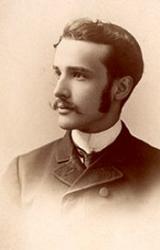
1864 - 1940 Person Name: Oliver Huckel, 1864-1940 Author of "O Mind of God" in The Cyber Hymnal Born: January 11, 1864, Philadelphia, Pennsylvania.
Died: February 3, 1940, Orlando, Florida.
Buried: Second Congregational Church Cemetery, Greenwich, Connecticut.
An 1887 graduate of the University of Pennsylvania, Huckel was known as the class poet, and spoke at the university’s celebration of the birth of American president George Washington, and at the 1887 graduation ceremony. He went on to study at Harvard University and Andover Theological Seminary, Newton, Massachusetts, and in 1890 was ordained a Congregational minister, and received a Master of Arts degree from the University of Pennsylvania, and a Bachelor of Sacred Theology degree from Boston University.
He then pastored in Weymouth, Massachusetts, until 1894, when he went abroad to study at the University of Berlin and Oxford University. He returned to America in 1896, serving briefly in Amherst, Massachusetts, then moving to the Associate Congregational Church, Baltimore, Maryland, where he stayed the next two decades. In 1917, he moved to the Second Congregational Church in Greenwich, Connecticut, and retired in 1905. He also served as chaplain at Johns Hopkins University, Baltimore, Maryland;, Cornell University; and the University of Virginia.
--www.hymntime.org/tch
Oliver Huckel


 My Starred Hymns
My Starred Hymns







